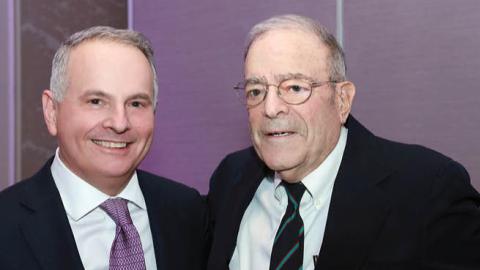Walter P. Stern, who died February 27 at the age of 93, was for decades the most influential American you’ve never heard of. An Air Force veteran who became one of the most well-regarded figures in the investment world, Wally was an exemplar of professional accomplishment and patriotism. But his most enduring influence came not from his professional work but from his avocation: the promotion public-policy work that would keep America secure, prosperous, and free.
In 1973, a family friend suggested that he attend a lecture by the founder of Hudson Institute, the legendary futurist Herman Kahn. Wally was immediately fascinated by Herman, a leading grand strategist of the thermonuclear age who popularized the notion of “thinking the unthinkable,” or imagining how nuclear war might be fought, to figure out how to prevent it. In addition to shaping nuclear deterrence and civil defense, Herman championed the idea to “expand the policy imagination” through creative, interdisciplinary inquiry, ranging from systems theory to future studies and international economic development.
Wally joined the Hudson Institute board soon after meeting Herman, and soon became chairman, a role he held, on and off, for more than three decades, before becoming chairman emeritus in 2006. It was thanks in large part to his leadership that Hudson became, according to Margaret Thatcher, one of the “small handful of institutions that helped us win the Cold War.”
Although Herman and Wally were fellow Jews with towering intellects, they couldn’t have been more different. Herman, who grew up speaking Yiddish and living above his mother’s grocery store, was emotive and Borscht Belt; Wally came from a genteel German-Jewish family in Scarsdale, N.Y., and was reserved and understated. Herman craved the limelight and loved wowing audiences in hours-long briefings, which often included presidents, prime ministers, defense ministers, and titans of industry. Soft-spoken Wally had a lifelong aversion to being the center of any attention, but when he spoke up — including to heads of state and finance ministers — they listened intently.
While infinitely charming, Herman was ill-suited to managing or fundraising for an organization. Wally recognized that Herman’s genius and unconventional approach, properly disciplined, could help America’s policy-makers find solutions to the country’s most vexing challenges: from the Arab oil embargo (Herman was among the first to suggest using Canada’s tar sands to supply American oil) to the Soviet military buildup (Herman was one of the architects of anti-ballistic-missile defense).
In this sense, Wally was the yin to Herman’s yang: the upright man in the proverbial gray suit who could not only write checks needed to support Hudson but, more important, could impose order, think through management challenges, and bolster Herman’s credibility in the financial community.
When Herman died suddenly, in 1983, many assumed that Hudson Institute would close its doors forever. But Wally Stern never countenanced such pessimism. True to the memory of his beloved friend, Wally worked with Tom Bell, Hudson’s president at the time, to save the Institute. With the support of the Lilly Endowment and the city of Indianapolis, Hudson moved its headquarters from Croton-on-Hudson, N.Y., to Indiana’s capital, where it remained until 2004. In Indianapolis, Hudson’s scholars produced pioneering work on domestic policy, from pro-growth economics to charter schools and the Wisconsin Works welfare-to-work program, which became the model for President Clinton’s 1996 bipartisan welfare-reform plan.
After 9/11, Wally recognized the importance of bringing Hudson back to its intellectual roots, in the promotion of national security, and led the decision to relocate headquarters to Washington, D.C. After he stepped back as chairman in 2006, his daughter, Sarah, eventually followed in his footsteps in her selfless dedication to the Institute.
As Hudson has adapted its policy focus to respond to the most pressing threats of the day — and to the future threats we should be preparing to face — Wally was vital to keeping the Institute grounded in the intellectual foundation laid by Herman Kahn, expanding the policy imagination, including by thinking the unthinkable, and predicting the unpredictable. Thanks to Wally’s leadership and dedication, Hudson has taken the lead in pioneering an ever closer U.S.–Japan relationship, in facing up to the threat posed by Vladimir Putin to European security, and in developing innovative military and economic strategies to meet the geo-tech challenge posed by the People’s Republic of China.
While other men of his wealth and status bought vacation homes, yachts, or private planes, Wally invested in ideas and in the American future. The charmingly rumpled Wally — who was joined in his philanthropic pursuits by his wife of 64 years, Betsy Stern — quietly shaped American public policy for decades while steadfastly refusing the credit that was his due.
Shortly before Wally’s death, Hudson celebrated its 60th anniversary, marking more than half a century of shaping the way America’s policy-makers approach challenges ranging from terrorism to the prospect of nuclear war to the return of great-power competition. His insight, persistence, modesty, and integrity were a model we will all continue to look up to. They will have an enduring impact on America and the world.
Read in National Review




















